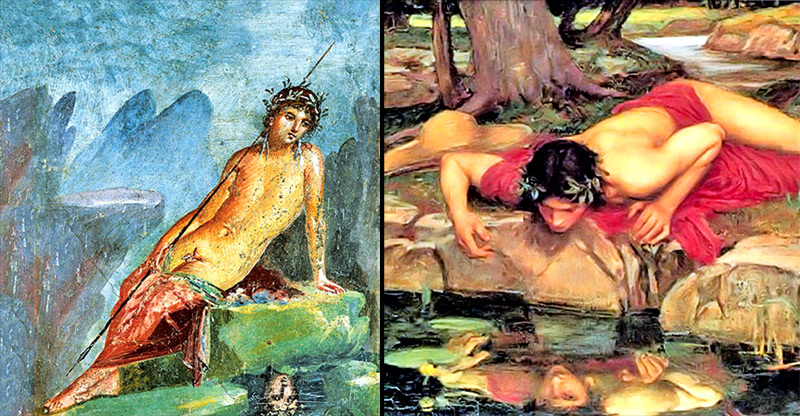The story of Narcissus is a classic tale from Greek mythology that explores themes of beauty, desire, and self-obsession.
There are several versions of the myth one stemming from Pausanias, a Greek traveller and geographer in the second century CE and another from the Roman poet Ovid in his work the Metamorphosis dated to the 8th Century CE.
The nymph, Liriope abducted by the River God Cephissus, gives birth to Narcissus who was known to be beautiful even as a child. According to custom she consulted the blind seer Tiresias of the boy’s future. Tiresias proclaimed that the boy would live a long life if he came to ‘know himself.’
As a youth of sixteen one day he got lost while hunting with his friends, and he came to be followed by a nymph called Echo. Echo was a mountain nymph and had her sensory ability changed following a dispute with Hera and Zeus. Echo had kept Hera busy with gossip while Zeus had affairs behind her back.
Punishment
According to Ovid, Echo had kept Hera busy until the lovers of Zeus had fled Mount Olympus. Once having uncovered the rouse, Hera took away her power of speech as a punishment. Hereafter, she could never speak except to repeat the last words uttered before her. Echo had deceived Hera with gossip; therefore she had to be content with the last words spoken by others.
One day, Echo chanced upon Narcissus who had been separated from his friends while hunting and fell immediately in love with him. She began to pursue him wherever he went; Narcissus began to sense that he was being followed. He asked “Who’s there” to which Echo replied “Who’s there”. This banter goes on for a few rounds leaving Narcissus in utter confusion as to what is happening. Echo finally comes close to him and reveals herself and attempts to embrace him.
Rejection
Narcissus is mortified and turns her away harshly. Echo devastated by the rejection wonders about in lonely glens with her body gradually wasting away to nothingness leaving aside her echo. Another young man by the name of Ameinias also falls in love with Narcissus who spurns him, for which Amenias cursed him. Nemesis the goddess of revenge hears this plea and proclaims that Narcissus will never be loved by the one he loves.
According to Ovid the poet after turning away both Echo and Amenias, Narcissus gets thirsty and looks for a pool of water to quench his thirst. He encounters a body of water that no animal has ever drunk from and stares at the image that is reflected. He sees his reflection and immediately falls in love with his own image.
Not knowing that it is his image that he has fallen in love with, Narcissus pines away, unable to be loved by the one he loves. He eventually transforms into the gold and white flower called the Narcissus which is named after him.
In another version attributed to the poet Parthenius of Nicaea in 50 BCE, Narcissus committed suicide unable to be reunited with his love. According to a version by Conon, a contemporary of Ovid, the episode also concludes in suicide. In this tale, the young man named Ameinias fell in love with Narcissus, who had already rejected many male admirers. Spurning Ameinias as well, Narcissus gave him a sword. Heartbroken, Ameinias took his own life at Narcissus’s doorstep, praying to the gods to teach Narcissus a lesson for the pain he caused.
Own reflection
Later, Narcissus walks by a pool of water and decides to take a drink. Upon seeing his own reflection, he becomes entranced by the sight which he could not make as his own. He ultimately took his own life, unable to attain the object of his desire. A century later, the travel writer Pausanias recorded a different version of the story, in which Narcissus falls in love with his twin sister instead of himself. When his twin sister died he stared at his own reflection and pined away, unable to attain his heart’s desire.
In all variations of the tale, Narcissus’s body disappears, leaving only a narcissus flower behind. Having spurned all his admirers in vanity, the gods as a punishment transformed Narcissus into a flower, forever gazing at his own reflection in the water. The flower, known as the narcissus or daffodil, thus became a symbol of self-love and vanity.









